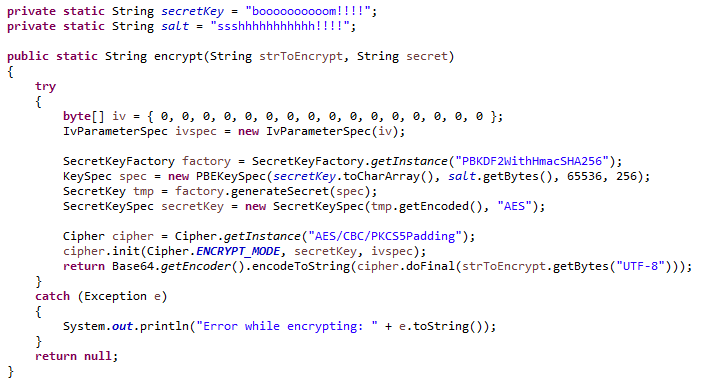Generate 256 Bit Key Java Keygenerator
- Using the KeyGenerator class and showing how to create a SecretKeySpec from an encoded key. AES Key generator: 36.2.3. Tampered message, plain encryption, AES in CTR mode: 36.2.4. Tampered message, encryption with digest, AES in CTR mode: 36.2.5. Tampered message with HMac, encryption with AES in CTR mode: 36.2.6. AES wraps RSA.
- RandomKeygen is a free mobile-friendly tool that offers randomly generated keys and passwords you can use to secure any application, service or device. KEY RandomKeygen - The Secure Password & Keygen Generator.
- Mar 12, 2020 Important: If the key and iv are generated with another tool, you must verify that the result is hex-encoded and that the size of the key for 128 is 32 characters, 192 is 48 characters, and 256 is 64 characters. The hex-encoded iv is 32 characters in length. Hex encoding means that each character in the key and iv are converted to its hexadecimal equivalent.
- Online RSA Key Generator. Key Size 1024 bit. 512 bit; 1024 bit; 2048 bit; 4096 bit Generate New Keys Async. RSA Encryption Test. Text to encrypt: Encrypt / Decrypt.
- Change this line. KeyGen.init(256); To. KeyGen.init(128); By default, Java supports only 128-bit encryption. Edit: If you need to encrypt content with keys larger than 128 bit, you have to use Java Cryptography Extension (JCE).
Key generators are constructed using one of the getInstance class methods of this class.
Java 256-bit AES Password-Based Encryption (6) I need to implement 256 bit AES encryption, but all the examples I have found online use a 'KeyGenerator' to generate a 256 bit key, but I would like to use my own passkey. How can I create my own key?
KeyGenerator objects are reusable, i.e., after a key has been generated, the same KeyGenerator object can be re-used to generate further keys.
There are two ways to generate a key: in an algorithm-independent manner, and in an algorithm-specific manner. The only difference between the two is the initialization of the object:
- Algorithm-Independent Initialization
All key generators share the concepts of a keysize and a source of randomness. There is an
initmethod in this KeyGenerator class that takes these two universally shared types of arguments. There is also one that takes just akeysizeargument, and uses the SecureRandom implementation of the highest-priority installed provider as the source of randomness (or a system-provided source of randomness if none of the installed providers supply a SecureRandom implementation), and one that takes just a source of randomness.Since no other parameters are specified when you call the above algorithm-independent
initmethods, it is up to the provider what to do about the algorithm-specific parameters (if any) to be associated with each of the keys. - Algorithm-Specific Initialization
For situations where a set of algorithm-specific parameters already exists, there are two
initmethods that have anAlgorithmParameterSpecargument. One also has aSecureRandomargument, while the other uses the SecureRandom implementation of the highest-priority installed provider as the source of randomness (or a system-provided source of randomness if none of the installed providers supply a SecureRandom implementation).
In case the client does not explicitly initialize the KeyGenerator (via a call to an init method), each provider must supply (and document) a default initialization. See the Keysize Restriction sections of the JDK Providers document for information on the KeyGenerator defaults used by JDK providers. However, note that defaults may vary across different providers. Additionally, the default value for a provider may change in a future version. Therefore, it is recommended to explicitly initialize the KeyGenerator instead of relying on provider-specific defaults.
Every implementation of the Java platform is required to support the following standard KeyGenerator algorithms with the keysizes in parentheses:
AES(128)DES(56)DESede(168)HmacSHA1HmacSHA256

The Java KeyPairGenerator class (java.security.KeyPairGenerator) is used to generate asymmetric encryption / decryption key pairs. An asymmetric key pair consists of two keys. The first key is typically used to encrypt data. The second key which is used to decrypt data encrypted with the first key.
Public Key, Private Key Type Key Pairs
The most commonly known type of asymmetric key pair is the public key, private key type of key pair. The private key is used to encrypt data, and the public key can be used to decrypt the data again. Actually, you could also encrypt data using the public key and decrypt it using the private key. Metal gear solid v the phantom pain key generator.
The private key is normally kept secret, and the public key can be made publicly available. Thus, if Jack encrypts some data with his private key, everyone in possession of Jack's public key can decrypt it. Ssl generate private key from ca-bundle or p7b free.
Creating a KeyPairGenerator Instance
To use the Java KeyPairGenerator you must first create a KeyPairGenerator instance. Creating a KeyPairGenerator instance is done by calling the method getInstance() method. Here is an example of creating a Java KeyPairGenerator instance:
The getInstance() method takes the name of the encryption algorithm to generate the key pair for. In this example we use the name RSA.
Initializing the KeyPairGenerator
Depending on the algorithm the key pair is generated for, you may have to initialize the KeyPairGenerator instance. Initializing the KeyPairGenerator is done by calling its initialize() method. Here is an example of initializing a Java KeyPairGenerator instance:
128 Bit Key Generator
This example initializes the KeyPairGenerator to generate keys of 2048 bits in size.
Generating a Key Pair
To generate a KeyPair with a KeyPairGenerator you call the generateKeyPair() method. Here is an example of generating a KeyPair with the KeyPairGenerator: